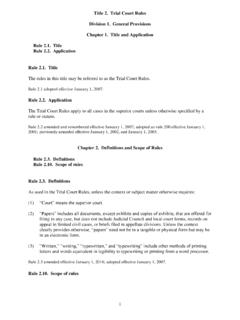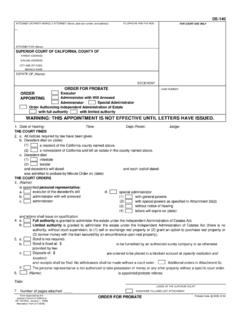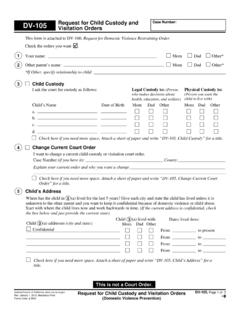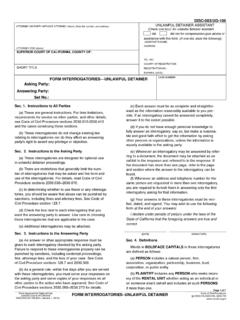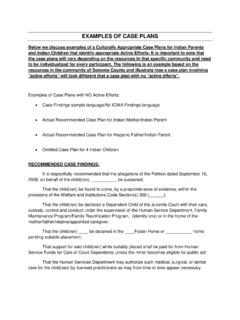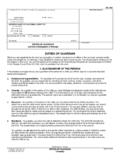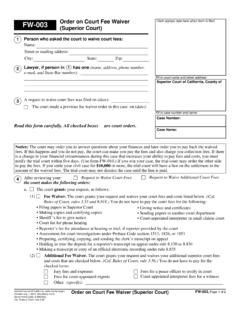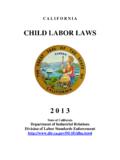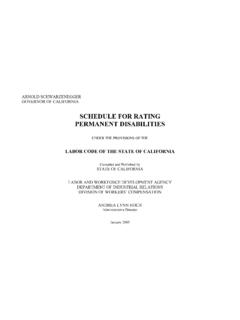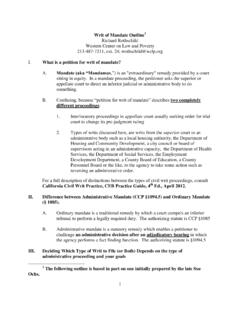Transcription of JUDICIAL COUNCIL OF CALIFORNIA
1 JUDICIAL COUNCIL OF CALIFORNIA455 Golden Gate Avenue . San Francisco, CALIFORNIA 94102-3688 This proposal has not been approved by the JUDICIAL COUNCIL and is not intended to represent the views of the COUNCIL , its Rules Committee, or its Legislation Committee. It is circulated for comment purposes only. INVITATION TO COMMENTITC SP21-08 Title civil Practice and Procedure: Remote Appearances Proposed Rules, Forms, Standards, or Statutes Adopt Cal. Rules of Court, rule ; amend rules , , , and ; adopt forms CIV-021, CIV-022, JV-145, and JV-146; and revoke forms CIV-020, FL-679, and FL-679-INFO.
2 Proposed by Ad Hoc Committee on civil Remote Appearance Rules Hon. Marsha Slough, Chair Action Requested Review and submit comments by Monday, November 15, 2021. Proposed Effective Date January 1, 2022 Contact Anne M. Ronan, Supervising Attorney Sturges, Attorney Summary and Origin The Ad Hoc Committee on civil Remote Appearance Rules recommends that the JUDICIAL COUNCIL adopt rules of court and forms to implement new code of civil Procedure section , enacted in Senate Bill 241 (Stats. 2021, ch. 214). That statute, which goes into effect January 1, 2022, authorizes remote proceedings in all civil cases, with special requirements applicable to juvenile dependency actions.
3 The statute also mandates that the COUNCIL adopt rules regarding certain deadlines and procedures, which are reflected in this proposal. In addition, the committee recommends forms to facilitate parties and courts in conducting proceedings remotely. The committee also recommends amending the current telephone appearance rules, to suspend them in part while these rules are in place, and revoking the current telephone appearance forms, which will be replaced by the new forms proposed here. Background Current rules The JUDICIAL COUNCIL and courts have long had the goal of improving access to the courts, including increasing ease of access through the use of remote technology where appropriate.
4 The arrival of the COVID-19 pandemic made such access even more important. During the early weeks of the pandemic, the COUNCIL adopted emergency rule 3, effective April 6, 2020, 2 authorizing courts to conduct proceedings remotely, with parties appearing at court proceedings by videoconference or expanded use of telephone appearances. For many months, remote proceedings have been an important means of balancing access to justice and the public health needs of parties, court staff and JUDICIAL officers, and the public generally. Now the Legislature, at the urging of stakeholders including the COUNCIL , has enacted Senate Bill 241 (Link A),1 authorizing, among other things, remote proceedings in all civil cases under new section of the code of civil Currently, emergency rule 3 authorizes courts to conduct JUDICIAL proceedings remotely.
5 As discussed below, effective January 1, 2022, new section will apply to remote proceedings in civil cases. The new section also requires the JUDICIAL COUNCIL to adopt rules of court to implement certain provisions of the statute and to amend the current rules to conform to the new statute. Proposed rule and the amendments to other rules proposed in this invitation to comment are intended to serve that purpose. Effective January 1, 2022, in civil proceedings, courts will need to comply with section and the rules of court proposed in this invitation to comment. To avoid any conflict with the new rules or any ambiguity, the chairs of the COUNCIL s internal committees will be submitting a separate report to the JUDICIAL COUNCIL proposing an amendment to emergency rule 3 that would exclude civil proceedings from the scope of the rule effective January 1, New law Senate Bill 241 enacts new code of civil Procedure section , effective from January 1, 2022, to July 1, 2023.
6 The provisions of the bill that are addressed by the proposed new rule are summarized here: A party (or witness)4 may appear through the use of remote technology in all civil cases(other than juvenile dependency) after providing notice to the court and all other permission of the court is required only in juvenile dependency actions.( (a) & (h).) After receiving such notice or request, the court has the discretion to require an in-personappearance only if:oThe court does not have the requisite technology to handle a remote appearance( (b)(1));1 Available at 2 All further statutory references are to the code of civil Procedure unless otherwise noted.
7 3 The proposed amendment would also clarify that emergency rule 3 still applies to criminal proceedings, as there has been no legislative enactment that applies in criminal proceedings. 4 Party is defined in the new statute, and in the proposed rule, as including any nonparty subject to discovery. 3 oThe court determines, on a hearing-by-hearing basis, that the in-person presence of theparty or witness would materially assist in the determination of the specific proceedingor in the effective management or resolution of the case. ( (b)(3)); oroAt a particular conference, hearing or proceeding, the quality of the technology oraudibility is preventing or inhibiting any of the following: The court s effective management or resolution of the matter; The court reporter s ability to make an accurate record; Counsel s ability to provide effective representation; or An interpreter s ability to provide language access.
8 ( (b)(2), (4) (6).) In addition, for evidentiary hearings or trials generally:oThe court, as well as a party, may decide to conduct a trial or evidentiary hearingremotely; andoA party may oppose that decision by a court or another party by showing why remotetestimony or appearance should not be allowed.( (d).) For juvenile dependency proceedings only:oAny person entitled to be present at a proceeding may request to appear remotely( (h)(1));oA party may file a request for the court to compel the physical presence of a party or awitness ( (h)(2)); andoA witness, including a party who is testifying, must obtain the consent of all theparties before a remote appearance will be permitted ( (h)(2)).
9 Section (k) provides that the COUNCIL must adopt rules addressing the following points: Deadlines by which a party must notify the court and the other parties of theirrequest to appear remotely. Procedures and standards for a JUDICIAL officer to determine when a conference,hearing, or proceeding may be conducted through the use of remote procedures and standards must require that a JUDICIAL officer giveconsideration to the limited access to technology or transportation that a party orwitness might Chief Justice formed the Ad Hoc Committee on civil Remote Appearance Rules5 to develop a recommendation for rules to comply with that mandate and to facilitate courts and parties in initiating and conducting remote proceedings under new section 5 The ad hoc committee includes as members representatives from the Advisory Committee on Providing Access and
10 Fairness, civil and Small Claims Advisory Committee, Family and Juvenile Law Advisory Committee, Probate and Mental Health Advisory Committee, Criminal Law Advisory Committee, Trial Court Presiding Judges Advisory Committee, Court Executives Advisory Committee, and the COUNCIL s Technology Committee. 4 The Proposal As mandated by statute, proposed new rule addresses deadlines and procedures for parties to provide notice (or a request in juvenile dependency proceedings) to the court and to other parties of their intent to appear remotely, including deadlines for opposing remote testimony if appropriate, and the procedures and standards to be applied by courts.

